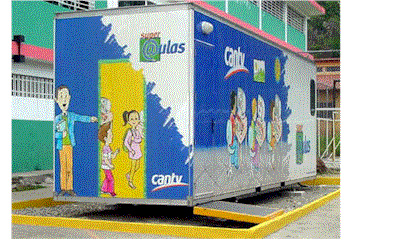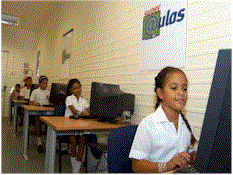|
BACKGROUND
To help reduce the digital divide in Venezuela, the
Cantv Corporation and the Ministry of Education and Sport jointly
developed the Super@ulas (“Superclassrooms”) Program, with the aim of
providing access to new information and communications technologies
for pupils at schools located in rural areas of Venezuela.
The program targets basic education in the country
and was designed to foster the mass adoption of internet use and to
strengthen the education of Venezuelan children, particularly those
located away from access to technology and unable to enjoy other
options for using the internet.
WHAT DO THEY INVOLVE?
The Super@ulas are corrosion-resistant, thermally
insulated, easy to install aluminum trailers that are fitted out with
eleven cutting-edge computers, one teacher’s desk, a printer, a webcam,
education software, high-speed internet access, adequate lighting, and
air conditioning.
One additional advantage is that they do not need
to occupy a space already assigned for teaching activities: instead,
they can be positioned as annexes to schools, without interfering in
pupils’ routine activities.

The program provides for the installation of 100
trailers across the country, 3 or 4 per state, and has been planned in
four phases, of which the first three have already been completed. As
of 30 June 2005, the program has catered to a total of 62,163 pupils
from 69 schools in 18 of Venezuela’s component states and territories.
They have accrued a total of more than 200,000 hours of training for
children, young people, and teachers at the target schools.
The fourth phase of the project is planned for
October to December 2005, with which there will be a total of 1,100
high-speed internet access points, capable of reaching more than
100,000 students. In addition, a further ten units will be installed,
as agreed with the Ministry of Education and Sport, in those states
with the most pronounced technological shortcomings.
WHERE ARE THEY INSTALLED?
 The
populations who are to benefit are jointly selected by the Ministry of
Education and Sport and Cantv. As a result of this, areas that had no
internet access now have a Super@ula, benefiting both the selected
school and its surrounding community. The
populations who are to benefit are jointly selected by the Ministry of
Education and Sport and Cantv. As a result of this, areas that had no
internet access now have a Super@ula, benefiting both the selected
school and its surrounding community.
In order to reach remote sites efficiently, Cantv
used a range of technologies, including, as appropriate: microwave
radio gear, high-bit-rate digital subscriber lines (HDSLs), or
satellite connections.
The Super@ulas are equipped with educational
software and licenses that help train children and young people. For
example: Numerópolis, an educational portal that offers ten digital
games for arithmetical skill acquisition, ranging from the third to
the sixth grades of basic education; Casita Mágica, an educational
game to educate preschool schoolchildren in home safety and hygiene;
and Moviltraining, which teaches the use of the internet and basic
computing tools (Windows, Office, Internet Explorer, etc).
Another noteworthy aspect of the Program is that
Cantv provides a skilled facilitator who trains the teachers and shows
them how to use the computers, the internet, and the educational
software, and how to use technology in teaching processes and in
managing and overseeing the Super@ula. The installed content and the
facilitator allow it to be used as soon as it is installed.
WHO ARE THE USERS?
Super@ulas receive users ranging in age from 5
years up to adults. However, around 63% of users are aged between 7
and 12, which is represents the age group at greatest risk of dropping
out of school.
Almost 61% of the users are studying the fourth,
fifth, or sixth grades of basic education, which are the levels when
most repeat-years are studied and, consequently, the levels where
continued education is most endangered and where most drop-outs
typically occur.
CONCLUSIONS
The Super@aulas Program has a special meaning for
the Cantv Corporation, since it has allowed to promote, in partnership
with the Venezuelan State, the development of information and
communications technologies within the nation’s basic education system.
Thanks to this initiative, Cantv is able to offer high-speed internet
access and educational materials that reinforce the reading, writing,
mathematics, and computer skills of thousands of pupils at rural
schools. At the same time, this Program allows the corporation to make
efficient contributions to the comprehensive education of children and
development of citizens.
Super@ulas have acquired iconic status in the
various localities where they are to be found, improving interactions
between schools and communities and reinforcing local governments’
commitments toward education.
The skillful handling of information technologies
and communication will be requirements of citizens who wish for full
insertion into a world of work that is increasingly dependent on
computers and digital data transmissions over hardwired and wireless
networks. It will be part of a new literacy that will demand, in
addition to reading and writing skills, the awareness and production
of complex documents presenting information and images through a
growing array of media and technologies.
We know about the enormous efforts that schools’
headmasters are required to make to keep their laboratories and
libraries up to date, particularly in this era, where there is so much
information, changing so rapidly. It is difficult to prevent costly
books from becoming obsolete in light of progress in the modern-day
world, and the internet offers us an enormous window onto those
information superhighways.
This century’s problem will not be the scarcity of
knowledge, but rather an overabundance of information. Providing
children and youngster with access to those realities will enable them
to better face those challenges and thus handle more competently that
surfeit of information; it will also train them in the fields of
reading and writing, mathematics, and basic awareness of computer
science.
To that end, we have also allowed for the
possibility of using a webcam for future webconferencing, to
facilitate distance learning.
The Super@ulas have been received with great
anticipation and enthusiasm – not only by the student bodies, but also
by the rest of their communities. Members of communities celebrate the
fact that their children now have the possibility of furthering their
knowledge with the vast array of information to be found on the
internet and of becoming the men and women of tomorrow who will bring
progress to their regions. The opinions of today’s Program
beneficiaries show this enthusiasm:
Mariali Sequera, ninth year at Urama
Educational Unit: “The arrival of the Super@ula at my school has been
spectacular; I think it’s really fantastic. It’s the best thing to
have happened to us, and I’m going to make the most of it because it
has given me my first ever opportunity to access the internet and a
computer.”
Mariela Fragosa, sixth-grade teacher
at the Pastor Rodríguez Manzo Bolivarian School: “We have longed for
this for a long time; it’s a dream come true. With the Super@ula our
schoolchildren are going to receive a complete learning experience and,
best of all, they are going to be up-to-date with new information and
communications technologies.”
Rosario Suárez, principal of
Guaicamacuto National School: “The Super@ula is a major step forward
for the school; it gives us access to the Internet, which it an
important learning tool. For most of our children, this is their only
opportunity to get online. Teachers ask their pupils to find
information on the web about current events, to add to the information
in their text books.”
“If the children are our tomorrow, then the time to
support them is today.”
Nyurka Rodríguez
International Affairs Coordinator
Compañía Anónima Nacional de Teléfonos
E.mail: [email protected]
|

